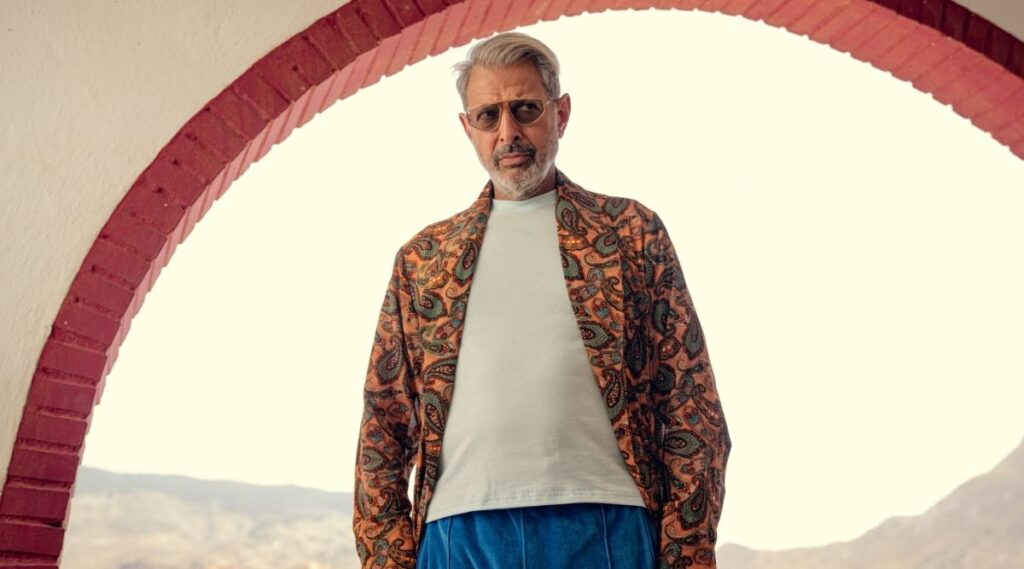Kaos Season 1 is a modern fantasy drama created for Netflix. Created and written by Charlie Covell, the British series stars Jeff Goldblum, Janet McTeer, Aurora Perrineau, Killian Scott, and many others. In a modern retelling of Greek mythology, Zeus becomes paranoid about his immortality. The death of Eurydice causes Dionysus to send Orpheus into the Underworld to bring her back.
This show reinvents a whole empire in a world without one and isn’t easy to replicate. The modernisation of Greek mythology requires much of it to take place in modern Greece, focusing on the island of Krete. This island was the center of ancient civilization, and many of the locations in the original stories remain today (even if the spelling of the island has changed).
The plot is fascinating and hard to pin down. It explores three worlds: Mount Olympus, Krete, and the Underworld. Every world has its own role in the story, only occasionally overlapping. But in Krete, it isn’t necessarily an ordinary world. A political structure exists with an authoritarian president with a troubled family history. They are victorious in a war against the Trojans and keep the survivors in an unfair and discriminatory society.
Some of the themes and storylines adapted into the modern era work brilliantly well, displaying how timeless some elements of legends can be. For example, the story of Caeneus is fantastically written, bringing trans and gender issues into mythology, where it has always been. Also, the plotline regarding the fall of Troy is one the most engrossing early in the series and helps to sow discontent in the family, paving the way for further fractions.

The pace in Kaos is poor, which feeds into a more significant problem. The whole series lacks intensity or venom. That is not to say there aren’t powerful scenes, but they are few and far between. It takes an age to get to them, too. The midsection of the episodes can be a slog, particularly in the Underworld. Getting to those periods where something is exciting and powerful is swamped by mediocrity and a lack of focus. At no point in the show is there a sense of urgency or drive. The audience has already sussed out some of the most impactful moments of the show.
The characters and the dialogue can be a mixture of talent. The show’s selling point is casting Goldblum as Zeus, and he deserves that spot at the top of the mountain. It is impossible not to be engrossed by him, even when he does the bare minimum. Goldblum has played the demeanor of a flamboyant ruler who is casually sadistic almost exactly before. He replicates the role of the Grandmaster from Thor: Ragnarok and translates it to Zeus.
What does change is the fear that Zeus’ immortality is waning. Goldblum brilliantly portrays that unease and delusion. As the issue gets deeper and the paranoia grows, Goldblum becomes more frightening. He holds the attention of not just mortals but immortals as well. At his best, he is captivating. At his worst, he can still sell the scene and be funny.
The rest of the cast is a mixed bag, especially the gods. None of them radiate power or presence, and perhaps that is intentional. This is not a full pantheon of Greek Gods, with only a few in the first season of Kaos. There is an underlying mission among the gods, featuring prophecies, conspiracies, and affairs. Hera (McTeer) is one of the key elements, and McTeer demonstrates various aspects of control and manipulation beautifully. But most of the actors do not look or perform like gods.

There aren’t extreme or profound demonstrations of might and immortality. Poseidon (Cliff Curtis) is disappointing, never actually doing anything except Zeus’ bidding. Hades struggles to gain a foothold in both his realm and above ground. The confrontation between Hades (David Thewlis) and Zeus could have had much more drama and emphasis.
Dionysus deserves a mention because he is a crucial part of the plot. While most connect to the mortal world in some way, Dionysus spends most of the first half of the show on Earth and powers the plot. His journey is more interesting than any of his family’s, but the stodginess of the pacing slows him down. Nabhaan Rizwan is energetic, but the lack of strength in the performances lessens the presence of what should be celestials.
The mortals are crucial to this combined effort of removing Zeus’ power, with again varying degrees of success. The actors use their native accents, not that of Krete. This leads to the appearance of Irish, English, and American accents. It initially seemed like Eurydice (Perrineau) was the lead of the whole show, but the sudden ending of episode one changed that opinion. She spends the season down in the Underworld, becoming Orpheus’ mission. Perrineau delivers a pretty subpar performance, not emotional or evocative.
Orpheus (Scott) spends considerable time alone and out of his depths. Scott’s portrayal is only slightly better than Perrineau’s, with much more physical acting and a better reaction to the enormity of the situation. Perhaps the best performance comes from Ariadne, the daughter of Krete’s President Minos. After a lifetime of guilt, the horror and truths she experiences are profound and engrossing. Leila Farzad brings a rage to the role that grows with intensity by the end of the season.

Most of the show is narrated by Prometheus, played by Stephen Dillane. Shackled to a wall and having his liver constantly pecked out, Prometheus is also Zeus’ best friend. He listens to his rambles and godly grievances. Prometheus constantly breaks the fourth wall, chatting to the audience. These moments are delightful and funny throughout the series. The looks to the camera work well and were the only things that drew chuckles out of me.
Visually and audibly, Kaos faces the same lack of sincerity and power. It is visually gorgeous, with spacious landscapes and some intriguing techniques used. Olympus is bright and expensive, the Underworld is filmed in black and white, and the normal world is meant to be compatively average. The problem is that both of those mystical realms feel empty.
There is enough going on around the main characters. There are not enough gods in Olympus, and the Underworld is dull to look at. Krete is lively, but not enough is done to infuse it with identity and personality. And it is frustrating that sex and violence are often cut away from. The show isn’t brazen enough.
The soundtrack is irritating, especially in the first and last episodes. There are nearly endless needle drops, and they throw one song after another. Barely enough time is given for dialogue or action to step in before another song is added. It’s too noisy and very quickly does your head in.
Kaos Season 1 is a middling reimagining of mythology. The execution brings down several fantastic ideas. Nothing is spectacular, and very few aspects are above standard. It stops itself from being too scandalous, there’s not enough in the budget to be epic, and it’s too boring to make the audience invest in what’s happening.
Goldblum’s casting is the talisman of the whole show, but so much of the show is just him wandering around Mount Olympus, pondering and not doing anything. But he is so talented and well-drilled at playing that role that he can get away with it. The others in the show are not. If there is a second season, the show must be bolder and braver if it wants to stay in the audience’s tongues.
Kaos Season 1 is available on Netflix.
Kaos Season 1
-
Rating - 6/106/10
TL;DR
If there is a second season, the show must be bolder and braver if it wants to stay in the audience’s tongues.





